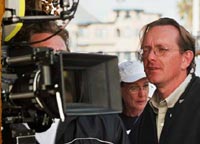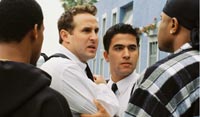Richard Dutcher is a Mormon filmmaker. But please don’t call him that.

It’s a label he once wore with pride, but no longer. When his films God’s Army (2000) and Brigham City (2001) were big hits with Mormons, he was hailed as arguably the finest director yet to emerge from the Church of Jesus Christ of Latter-day Saints (LDS).
But then Dutcher did something dangerous: He made an edgy, gritty film, one that wasn’t all smiles but was more in-your-face in depicting man’s sinful nature, including—gasp!—that of a Mormon missionary, who falls into sin while doing his missions work.
Because of that film, States of Grace, Dutcher has been shunned by the LDS church. He also says that many other recent “Mormon films” are so bad, he doesn’t want to have anything to do with the label.
States of Grace releases to DVD today after quite a year for Dutcher. He has not only been rejected by the Mormon community, but also saw his movie create a bit of controversy. Grace was playing at a San Diego theater when a box office worker told customers that it was “being advertised as a Christian film, but it’s really a Mormon film.”
Some Mormons were outraged and planned a protest, but Dutcher called them off, preferring to keep the peace and let the film speak for itself.
Grace, a well-crafted and powerful film, begins with a drive-by shooting witnessed by two Mormon missionaries named Farrell and Lozano. One of them saves the life of a shooting victim, who ends up considering a spiritual change. Farrell and Lozano also befriend a fallen Pentecostal pastor, Louis, now a homeless man, and a neighbor, Holly, who has a painful past. Elements of grace come crashing into all of these lives.
In the film’s most powerful scene, Farrell and Lozano find Louis, the homeless man, passed out behind a dumpster. Lozano wants to take him to their apartment to feed him, but Farrell objects: “It’s against the rules!” Lozano says, “We can keep the rules and leave him here lying here among garbage. Or we can break the rules and keep the Commandments. . . . What would Jesus do, Farrell?” “I don’t know!” “Jesus would grab his feet!” It ends up being a study in contrasts between the two missionaries—one who “gets” grace, the other shackled by legalism.
Dutcher, 42, graduated from Brigham Young University with a film degree. He and his wife Gwen live in Mapleton, Utah, with their five sons and another child on the way.
We chatted with Dutcher as he looked forward to today’s DVD release of States of Grace.
Did you grow up in a Mormon home?
Richard Dutcher: No, I grew up in a conservative Pentecostal family, and our preachers were not very supportive of film-going. I didn’t see any movies until my mother [a single mom who had divorced his unfaithful and alcoholic father] started dating this Mormon guy, and the Mormon faith doesn’t have any prohibitions against movies.

You ended up at Brigham Young, so I assume you became a Mormon somewhere along there?
Dutcher: I was 8 when my mother married this Mormon guy, and it was like, “Well, we’re going to be Mormons now.” But whenever I was with my mother’s family, we’d attend Pentecostal services. And my real father’s family were Baptists. So we kind of hopped all around.
It’s strange to be a part of different faith communities. Pentecostal preachers were trying to save me from Mormonism. And Mormon leaders thought any other religion was a waste of time. But as a kid, I didn’t feel any need to really make a choice one way or the other. And I even feel less so as an adult.
But you ended up settling in the Mormon church?
Dutcher: My wife and kids predominantly attend the LDS church, but I’m so busy that I’m really not active in that community any more. I travel so much, and I find myself just choosing whatever service appeals to me that week. When I’m in Burbank, I attend a Catholic church. And I’ve recently noticed a Greek Orthodox church across the street, so I’ll probably hit that too.
How would you describe States of Grace?
Dutcher: It’s about a group of people in contemporary Santa Monica, California who are all affected by a drive-by shooting in one way or another, about how it brings them together.
But I find that if you tell people it’s about grace and spiritual struggle, people generally run in the opposite direction, because that’s not what we’ve been trained that movies are supposed to do. So I’d probably focus on the drive-by shooting and let them discover the spiritual themes for themselves.
It’s a sequel to God’s Army, right?
Dutcher: Well, I would only say that in the Mormon community, because I wanted them to know it’s a follow-up to a film they had liked. But I didn’t want to eliminate anybody who hadn’t seen the first God’s Army movie, or who wasn’t Mormon. So, it’s been kind of confusing because we’ve been trying to push it both ways, as a sequel to God’s Army and by saying it’s just States of Grace.
Actually, it kind of backfired on us, because a strange thing has happened in the Mormon community over the past five years. When God’s Army came out [in 2000], it created a little “Mormon cinema movement.” Before God’s Army, there hadn’t been many films by and about Mormons; after that, there was a flood of really crappy movies. But I didn’t realize that, because I’d away from the Mormon community for a few years while making other movies. When we came back, we didn’t realize that the reputation for Mormon film had sunk to such a level that by calling a film God’s Army 2, it was almost a bad thing because people thought, Oh no, another Mormon movie, because they’d been burned so many times.
When you say “Mormon movies,” do you just mean movies by, about, and for Mormons? Or are they for a wider audience?
Dutcher: Well most of the Mormon filmmakers are delusional; they think their films would appeal to a larger audience. Lifetime Mormons who’ve never been outside of Utah have no idea what would make a film cross over to another community. They have such a limited view of the religious world, they just don’t have a clue how to make a film that might appeal to other people.
My idea of Mormon cinema would be films that take a deep, probing look into Mormonism—its history, doctrine, contemporary life, to explore things that were pretty much untapped. But that’s certainly not what Mormon cinema became. It became something so much more superficial and meaningless.
Did you do your two-year stint as a Mormon missionary?
Dutcher: I did. I went to Southern Mexico in 1984. It was a wonderful adventure. And for that reason, I thought, No filmmaker had ever really seriously approached that experience and said, “This is what it’s like.” Before that, I’d been writing a lot of scripts, basically whatever I thought the market would want—romances, comedies, horror films, vampire movies, it didn’t matter. It wasn’t until I got the idea for God’s Army that I wrote something deeply personal and based on my own experience.

Is States of Grace also autobiographical?
Dutcher: Very much so. The drive-by shooting scene came directly from my own experience in Mexico, where we walked out of a meeting with a family and right into a drive-by shooting. And because there weren’t many people around, I was the one trying to save this guy’s life. In real life, it turned out differently than in the movie: The guy died right there in front of me. So that always stuck in my mind, and States of Grace was an opportunity to do something with that.
God’s Army did well in theaters, but States of Grace didn’t. Why?
Dutcher: To me, it was by far a better film than God’s Army, but we couldn’t give tickets away. I think it’s because people thought it was going to be just another crappy Mormon movie.
Sounds like you’re up against quite a perception problem?
Dutcher: Yes, that’s the battle I’ve been fighting in the Mormon community. Word’s gotten out that my films are a little edgier than the others, and have a little more depth and are actually about something. And I think the Mormon community just doesn’t have reverence or respect for art. It certainly doesn’t understand film as an art form. So there’s a big educational curve that has to take place before the Mormon community will start taking film seriously.
I read a quote from someone who likes your films because you don’t just do “movies about the Osmond twins.” What’s he mean by that?
Dutcher: I think most Mormon films are expressions of “the Mormon aesthetic,” and have very little to do with anything at the heart of Mormonism. I mean they’re really not about doctrine or history; there’s really no thought put into it. It’s just simply a trifle, a piece of entertainment, something that won’t offend.
The Mormon community, by and large, judges their films based on what’s not in them—if there’s no nudity, no violence, and no harsh language, then it must be a good film. I try to point out the lack of logic to that, where we should be judging film based on what IS in it—good acting, story, craft, some thought, some theme. But I think most of the cinematic expressions coming out of the Mormon community are just, “Let’s not offend. Let’s do something the preacher won’t get mad about,” rather than telling the stories that have to be told, and exploring the territory that has to be explored.
Page 2: ‘I don’t know if I’m brave or stupid.’
Copyright © 2006 Christianity Today. Click for reprint information.











